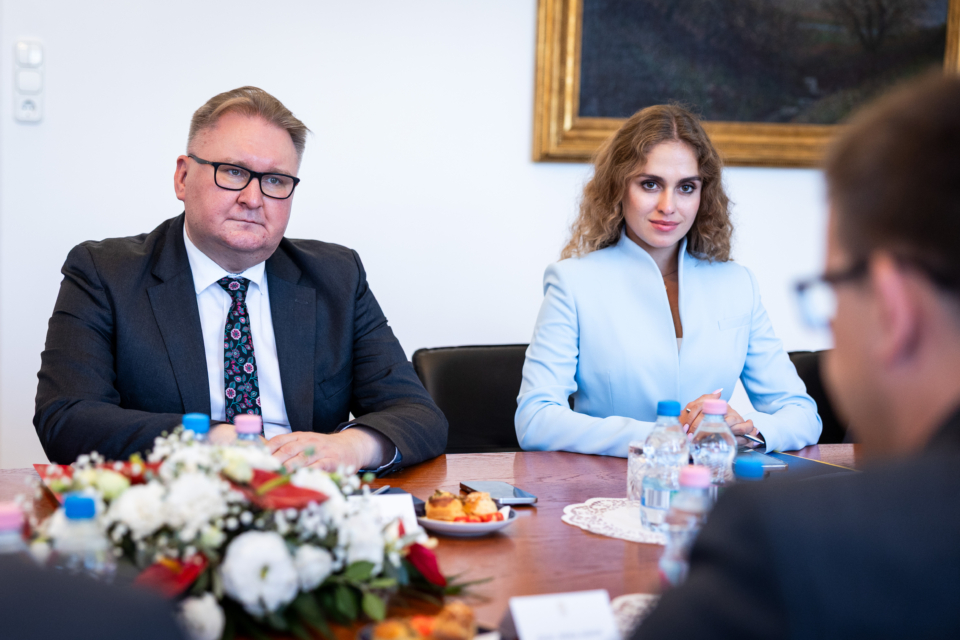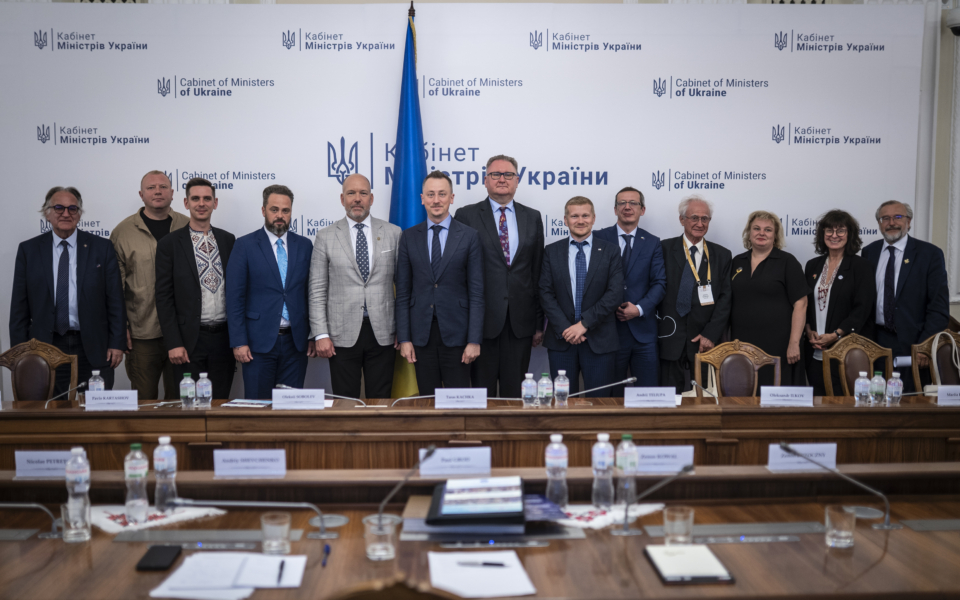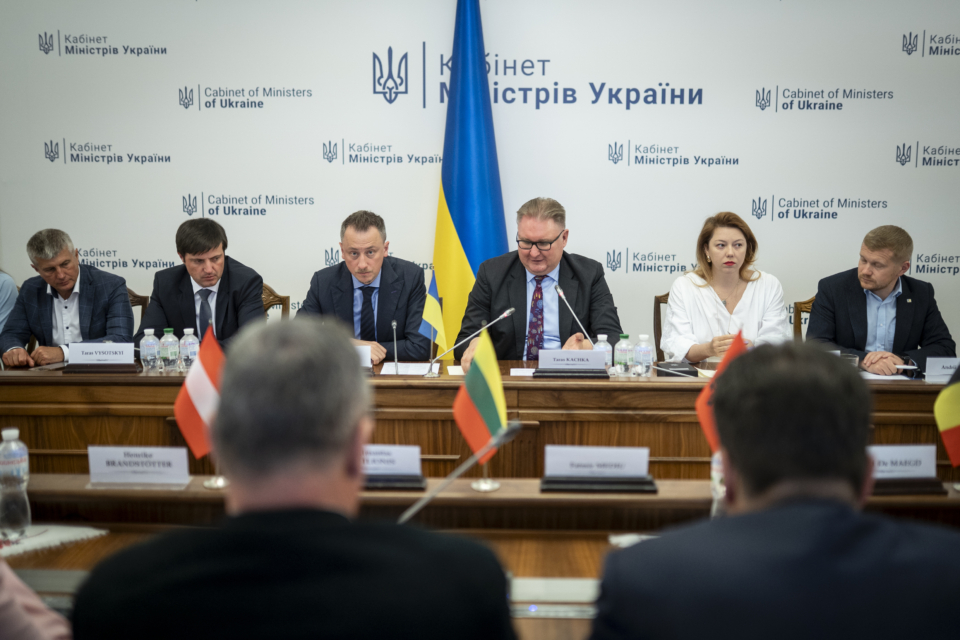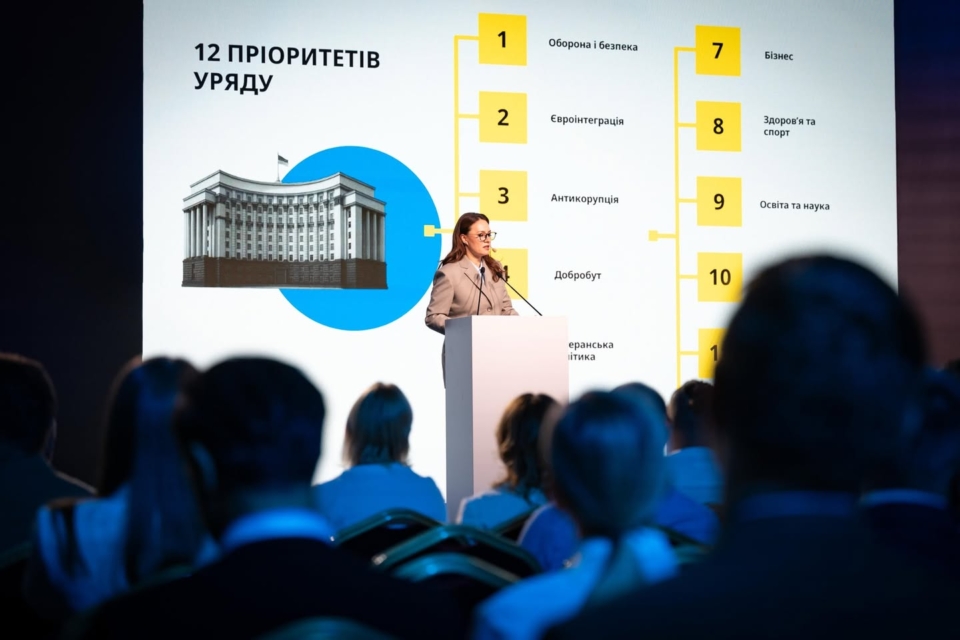A Conference on Law Enforcement Reform as a Key Element of Ukraine’s European Integration Took Place in Kyiv
Наш шлях до ЄС
01.07.2025
On July 1, Kyiv hosted the conference “Comprehensive Reform of the Law Enforcement System as a Key Element of Ukraine’s European Integration”.
Participants included Deputy Prime Minister for European and Euro-Atlantic Integration – Minister of Justice of Ukraine Olha Stefanishyna, Minister of Internal Affairs of Ukraine Ihor Klymenko, Chargé d’Affaires a.i. of the European Union Delegation to Ukraine – Head of Cooperation Programmes at the EU Delegation to Ukraine Stefan Schleuning, Head of the European Union Advisory Mission for Civilian Security Sector Reform in Ukraine Rolf Holmboe, among others.
In her address, Deputy Prime Minister Olha Stefanishyna noted that the reform of law enforcement agencies was one of the seven political recommendations of the European Commission, the implementation of which allowed Ukraine to take a step towards EU membership.
“This is about a comprehensive review of law enforcement work to create an effective, structured system that guarantees balance and access to justice, so that law enforcement bodies can deliver the most important thing – justice,” the official emphasized.
According to her, in order to achieve these ambitions and build a European-standard system, the Comprehensive Strategic Plan for Reforming Law Enforcement Agencies was developed and approved by the President of Ukraine in May 2023, followed by the adoption of its Action Plan in 2024. The development of this document brought together an exceptionally broad range of stakeholders: the Office of the Prosecutor General, state and law enforcement institutions, judicial bodies, and, in particular, the Ministry of Justice as the executive authority.
“The Ministry of Justice plays a key role in ensuring balance in the justice system and access to it. Therefore, the implementation of the Action Plan is our priority. The document is synchronized with the ‘Justice, Freedom and Security’ block of the Rule of Law Roadmap, which is a necessary step for opening negotiations with the EU on the first cluster, ‘Fundamentals.’ Just last week, all EU leaders (with the exception of one) confirmed that Ukraine is ready to open negotiations under this Cluster. This means that now is the time to set priorities for future reforms, particularly in the field of law enforcement. In my opinion, the priority is clear – the institutionalization of law enforcement activities,” Olha Stefanishyna stressed.
In his speech, Minister of Internal Affairs Ihor Klymenko spoke about the work of the Ministry of Internal Affairs system in wartime. He underlined that the primary task today is the defence of the state, and all the efforts of the Security and Defence Forces, including police officers, rescuers, border guards, and National Guardsmen, are aimed at protecting the country and its citizens.
The Minister emphasized that the comprehensive reform of the law enforcement system is part of the negotiation process for Ukraine’s accession to the European Union. He stressed that without modernizing the law enforcement system, enhancing its transparency, accountability, and public trust, it is impossible to build an effective and modern European-style state.
“The Action Plan for the Implementation of the Comprehensive Strategic Plan for Reforming Law Enforcement Agencies is a detailed roadmap for deep transformation, covering all key areas of reform and defining clear mechanisms for its implementation. At the centre of this transformation is the creation of a clear, logical architecture of the law enforcement system in which each body has defined powers. This will make the system understandable, manageable, and effective,” Klymenko noted.
He explained that the Action Plan includes six strategic directions:
- Institutional and legal unification – creating a transparent, logical, and effective architecture of the law enforcement system by eliminating duplication of functions and forming a unified legal space.
- A proactive model for combating crime – focusing primarily on crime prevention.
- Digital transformation and technological renewal – modernising processes, introducing criminal analysis and a risk-based approach.
- European integration and international cooperation – harmonising national legislation with EU law, expanding partnerships, and strengthening interoperability.
- Human rights protection, trust, and transparency – ensuring a people-centred approach, guaranteeing the rights of victims and witnesses, developing child-friendly justice, and strengthening accountability and integrity.
- Support for war veterans returning to service – creating conditions for their employment.
“These efforts are based on principles of integrity, transparency, and close integration into the European security space. We are building a system with zero tolerance for corruption, open to public oversight. At the same time, Ukraine is steadily affirming itself as a reliable partner in the joint fight against transnational threats,” the Minister added.
For his part, Chargé d’Affaires a.i. of the EU Delegation to Ukraine Stefan Schleuning stated that all these reforms must be people-centred, implemented in an atmosphere of openness and integrity, and in line with European standards.
Head of the EU Advisory Mission for Civilian Security Sector Reform in Ukraine Rolf Holmboe underlined that the implementation of the Comprehensive Strategic Plan for Reforming Law Enforcement Agencies and its Action Plan is a key requirement for Ukraine’s EU accession. He praised the work of the Ministry of Internal Affairs of Ukraine in this regard and assured of unwavering support in implementing the Plan.
“We are deeply impressed by Ukraine’s ability to carry out this comprehensive and transformative reform process in the midst of a full-scale war. I doubt we have ever seen such a level of commitment to reforms under such circumstances. It is an act of resilience and a clear statement of Ukraine’s determination to secure its future in Europe. The task now is to extend reforms across the country and make them deep, lasting, and irreversible. This is a transformative process that will firmly anchor Ukraine in the European family of democratic states,” Holmboe stressed.
During the conference, Deputy Minister of Internal Affairs of Ukraine Oleksii Serhieiev presented in detail the Action Plan for the implementation of the Comprehensive Strategic Plan for Reforming Law Enforcement Agencies as part of Ukraine’s Security and Defence Sector for 2023–2027. The Plan includes 199 specific measures grouped into 49 tasks, with 50 stakeholders involved in its implementation – including state bodies, military administrations, civil society organisations, and academic institutions.
“Successful implementation of this Action Plan will allow us to move to a qualitatively new level of functioning of the law enforcement system. For citizens, this will mean real and tangible changes. It will be rapid response through the single number 112, modernisation of the alert system, transparent investigations within electronic criminal proceedings, and confidence in the reliable protection of their rights, especially when it comes to children or victims of crime,” the Deputy Minister underlined.
The event was organised by the Ministry of Internal Affairs together with the European Union Advisory Mission (EUAM) in Ukraine and the Office of the Deputy Prime Minister for European and Euro-Atlantic Integration of Ukraine.
Other news
All news













